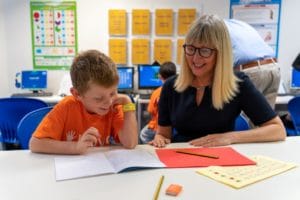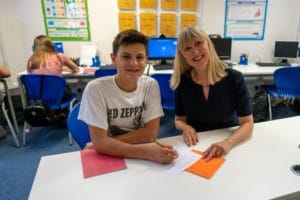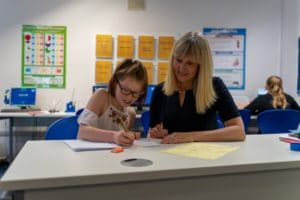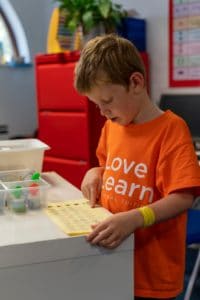Helping Your Child With Post Lockdown
Have a House Meeting
It is a good idea to ask your child to write a list of questions that concern them about returning to school. This is an opportunity to re-assure them that, thankfully, Covid 19 has actually harmed very few children. Write an agenda with the points you want to discuss, and allow the children to add to it.
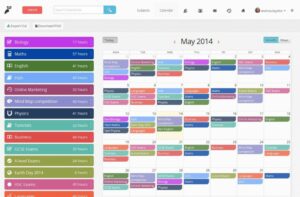 Agree a Plan
Agree a Plan
Remember all those things you wished you hadn’t let go during lockdown? Now is the time to set up a new routine with regular meals, homework, chores and leisure time. Habits are essential to regulate our moods. This will help them feel more secure and in control.
Talk to the Teacher (especially if it is a transition year)
Take any opportunity to talk to the teacher or school about your child’s special needs, personality, strengths and weaknesses. This may be a challenge, due to Covid 19 restrictions, but not to be overlooked. Understanding a child usually helps teachers teach that child more effectively. It is a good idea to get the children on the teacher’s radar if you have major concerns. One of my own children experienced some ‘extra’ anxiety going up to secondary school. We made sure we spoke to the SEN (special educational needs) Coordinator and got them, some extra visits to the school, to familiarise himself. They then showed us around as if they owned it!
Click here to book your free post lockdown assessment
Less Screen Time More Park
Many children have had very little contact with their friends. More introverted children may be exhausted from returning to school and many may take some time to adjust. I would expect a few ups and downs as children get used to meeting real people again and re-learn the social skills they may have forgotten.
Try Something New
Children will look to us to set the mood. We have all experienced stress and maybe loss during the lockdown. A positive ‘we can do this’ is the best attitude. This time will pass, and we will overcome together.
 Be Prepared
Be Prepared
Practical preparations are important to help the child get ready mentally. A new uniform or bag might seem a small thing, but it can help your child imagine themselves into their return. It may also be a good opportunity to talk through their hopes and fears.
Be Realistic
Having 6 months of no school is not going to be corrected overnight! It may be quite some time before children have caught up with where they need to be. For some of the weaker students it may be necessary to seek out extra support.
All change is stressful even if it is ‘good’ change. I would encourage all parents and teachers to normalise the situation as much as possible, while being sensitive and thoughtful about the adjustments needed. A bit of extra down time, a good routine and a few extra hugs will go a long way.
5 Top Reasons to Get a Tutor
-
Confidence
The number one reason to get a tutor is to build a child’s confidence. As we all know, anyone who loses confidence in their abilities often switches off and stops learning. Maybe the teacher is moving too fast, or maybe it is a concept that they don’t get first time. Alternatively, they may start getting things wrong which re-enforces a downward spiral.
When your child says ‘I can’t do maths,’ or ‘I hate writing,’ it might be a time to think about getting extra help.
-
Frustration or Hating School
For whatever reason, some children’s frustration with learning leads to tears and anger. Homework or classwork might be a problem. If a child is finding it difficult to read for example, they are not going to be able to access most of the others subjects either. If they are struggling in maths, they may not be able to do the homework that is given to the rest of the class.
Finding a good tutor who can diagnose the educational causes can solve a problem for the whole family.
-
Moving House, School, Family Changes
Any change, even if it is for the better, is stressful. An increase in stress will always reduce a child’s ability to learn for a period of time. Therefore, changes such as moving house, country, school or family changes often lead to gaps forming in a child’s educational development. If they happen to be essential building blocks, this can develop into a problems later on.
-
Preparing for Big School
If pupils are behind, in any significant area, at the end of Primary it may be difficult to catch up at the Secondary level. Transition from Primary to Secondary school is a major change in teaching styles. In Primary Schools, pupils are all in one class, taught mostly by a single teacher. Secondary school, although more stimulating, can lead to pupils forgetting or not practicing skills learned at the Primary level. The challenge is greater, the number of teachers is greater, but therefore, so is the difficulty in catching up.
A tutor can help a child, either before Secondary School, or outside the Secondary classroom deal with these issues.
-
Exam Preparation
Getting ready for exams is always a good time to get a little extra help. 11+ Common Entrance Assessments, SATs and GCSEs require a lot of extra work and are important milestones for our children’s future. If parents and children want to do their best it is often worth investing in specialist help to give that boost in performance that may be needed.
Really experienced tutors will have helped many students through their exams and will be know what is required.
“He Wants To Be There!”
Enrico enjoys his tuition sessions so much that his father was amazed!!
Enrico first came to I Love to Learn because he wanted to get a scholarship for an independent school. Enrico’s father was very pleased with the assessment and noticed the increase in his confidence straight away. He said, “Just the assessment made him very, very interested and now he is really doing a lot of homework independently. It has made him much more enthusiastic and motivated.”
 He is very impressed with Enrico’s attitude to learning and can see great progress as well. He is impressed with his written work and can see a big improvement.
He is very impressed with Enrico’s attitude to learning and can see great progress as well. He is impressed with his written work and can see a big improvement.
Christmas Writing Competition Prize Winners!
 We are so pleased to give out prizes to our lovely competition winners! They all did beautiful writing about the snow leopard and husky that we had on display. We were very impressed with the hard work and research for the entries and the standard was high overall. We enjoyed reading all the entries and felt that the quality of the winners had done very well to rise above the crowd.
We are so pleased to give out prizes to our lovely competition winners! They all did beautiful writing about the snow leopard and husky that we had on display. We were very impressed with the hard work and research for the entries and the standard was high overall. We enjoyed reading all the entries and felt that the quality of the winners had done very well to rise above the crowd.


Writing Competition Prize Giving
Saturday 28th October
Thank you all for coming to the very enjoyable event. Many thanks to Justin Strain (local author) for judging for us is such a generous way.
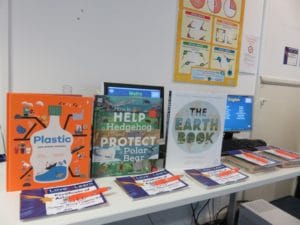



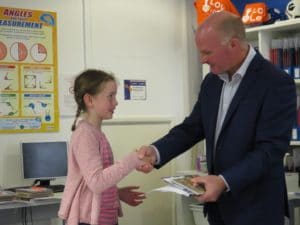
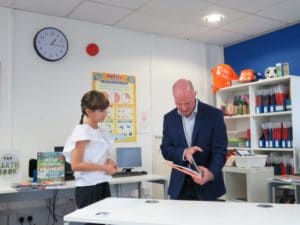

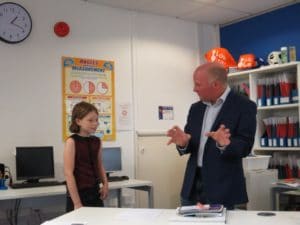


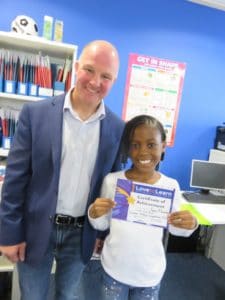


https://www.goodreads.com/author/show/17663881.Justin_Strain
Summer School Pics
Here are some great action shots from our Summer School this August
Our students came to us this August for a whole week of tutoring. We really love teaching summer school as all the students make such great progress and have a great time!

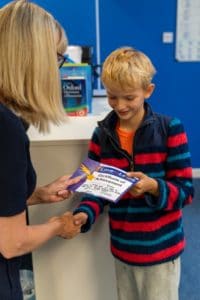
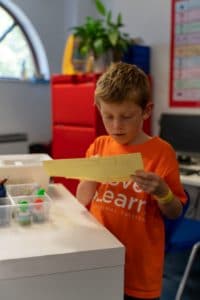
Read more about Summer Learning Loss here……
Summer Writing Competition
I Love Our World
Summer Story Writing
Imagine a setting, near or far. Create characters, human or animal. Describe problems and difficulties they face. Think of ways their problems are solved.
Summer Writing Competition 2019!
Your school could win £100 in book tokens to celebrate if one of your students is the overall winner!
Last year was a great success and we had some wonderful writing from local children. We are keen to repeat this and have invited local author, Justin Strain, to judge this year’s competition for the second year running. His first book, ‘The Secret of the Scarlet Ribbon’, was shortlisted for the, 2018 Times/Chicken House Children’s Fiction Award. He is currently writing the sequel among other novels!
Competition Details
The theme is, ‘I Love Our World’, issues that hi-light caring for the natural world and the problems involved with living in a polluted environment .
Here are the criteria, for Justin to use, to judge the entries;The stories will be judged upon;
1) How children use powerful descriptive language to create their settings and bring their characters to life.
2) How they use narrative structure to develop the plot (including a clear opening, build up, problem, resolution and ending.
3) How their story explores the key theme of caring for our environment – How we can explore ways to love our world.
We have three age categories
- Ages 6 to 7
- Ages 8 to 9
- Ages 10 to 12
Competition Deadline: Entries must be submitted by 7th September.
Entries To: Linda Jones, I Love to Learn Professional Tuition, 3 Beacon House, Cumberland Business Centre, Southsea, PO5 1DS.
Email; tutors@ilovetolearn.co.uk
Winners Announced: Monday 23rd September
Prize Giving: Saturday 28th September at our ‘I Love to Learn Professional Tuition Centre’ in Portsmouth, with Justin Strain.
To help children get started and to encourage them to ‘have a go’ here are some top tips;
Top Tips
- Try and imagine a scene as your character would experience it. Showing the reader what the character; sees, hears, tastes, smells, feels. This can be really powerful.
- Think about how your characters move, speak, and react and write choosing words carefully to explain this.
- Use similes to give readers more information that help you describe your images more fully.
- Break up you story into paragraphs to show a change of place or time. Planning your story will really help.
Lastly, don’t worry too much about spelling as you can edit your writing later on. Enjoy writing and have fun creating your own story!
We are so excited about this opportunity to celebrate creative writing and hope our enthusiasm will inspire local children to write this summer.
Are You Looking for a Tutor?
Find Out About the Service We Provide
Never Stop Learning-Summer Fun
AVOID SUMMER LEARNING LOSS
For most children, summer is a time to leave classes and homework behind. While summer is a holiday from school, it does not have to be a holiday from learning. The summer holiday is great for recharging your children’s batteries, because if they are not using the skills and knowledge that was learned in the classroom, they will find themselves lagging behind when school starts up again.
 When they return to school in September after the long summer break, students can find themselves struggling to catch up. Skills and knowledge gained throughout the school year fade during the summer months. At I Love to Learn, we have found that loss of content retention begins within 24 to 48 hours of learning unless the new information is reinforced or applied immediately. That is why, during summer holidays, even the best students forget some of the lessons they had learned during the school year. After a month without reinforcement, approximately 80 percent of what a student has recently learned can be lost.
When they return to school in September after the long summer break, students can find themselves struggling to catch up. Skills and knowledge gained throughout the school year fade during the summer months. At I Love to Learn, we have found that loss of content retention begins within 24 to 48 hours of learning unless the new information is reinforced or applied immediately. That is why, during summer holidays, even the best students forget some of the lessons they had learned during the school year. After a month without reinforcement, approximately 80 percent of what a student has recently learned can be lost.
Now it is also true that children do need a break to rest and do other things. In fact most learning does rebound after the holiday to overtake the previous level.
For children who have struggled in school, summer is an invaluable opportunity to catch-up on key skills and feel more confident when they return to class. For students who do well, it is an opportunity to keep their enthusiasm for learning high.
Click here to find out about our Summer Lessons…
FUN SUMMER LEARNING TIPS
We never stop learning so here are some ideas to help encourage our children’s learning and have some fun this summer.
Learn about time: allow children to be the family timekeeper and get them to wear a watch every day.
Learn about money: do a car boot sale with your children or they could start their own business (e.g. making and selling lemonade).
Learn about measurement: read recipes, use scales and cook delicious food together.
Learn about the past: by letting them interview grandparents or an elderly neighbour. This can really bring ‘history’ to life.
Improve your writing: by encouraging them to keep a diary every day. Children can maintain their writing skills and capture many memories for the future.
Practice your reading: Take part in the Library Service reading challenge which rewards children for reading a minimum number of books.
Also, as the new school year approaches it may be useful to discuss routines and agree how to organise time, work and anything else which need to be done.
Finally, if they still complain about being bored, try saying “well I guess I haven’t given you enough chores yet!” and see what happens.
Summer Learning Loss can be significant:
Blasting Through to the Next Level!- School Transition
Blasting Through to the Next Level!-School Transition
Top 5 Concerns for Parents
-Bullying
-Safety
-The amount of homework
-Adjusting to having lots of teachers
-Making new friends
Top 5 Concerns for Children
-Getting Lost
-Losing old friends
-Homework
-Discipline and -detentions
-Being bullied
(UCL Research)
Pupil and Parent Concerns
Many of our little superheroes will soon be pushing through to the next level at school. This may be a transition between Infant to Junior or Junior to Senior. Even changing year groups can be hard for younger children.
Do you remember the feeling of excitement and fear of going up to a new class or school? I certainly remember it being scary and stressful!
Now is a good time to talk to your kids about these changes. Fear of the unknown is the worst thing, especially for imaginative young minds.
Helping with Transition
It is a good idea to ask your child to write a list of questions themselves. Although you never know what their concerns might be, they may include some of the things listed above.
Take any opportunity to talk to the new teacher or school about your child’s special needs, personality, strengths and weaknesses. Understanding a child usually helps teachers teach that child more effectively. It is a good idea to get the children on the teacher’s radar if you have major concerns e.g. a special need.
One of my own children experienced some ‘extra’ anxiety going up to secondary school. We made sure we spoke to the SEN Coordinator and got them some extra visits, to the school, to familiarise himself. They then showed us around as if they owned it!
Practical preparations are important to help the child get ready mentally. A new uniform or bag might seem a small thing, but it can help your child imagine themselves into their new role. It may also be a good opportunity to talk through their hopes and fears.
Good News
The good news is that most of these fears reduce very quickly, and mostly go away, by the end of year 7. In fact only 3% of children are worried after a term at Secondary School (according to a University of London study). Most students are ready to develop new friends and their interest in their schoolwork increases. Our experience as parents has been very positive. It has been a (mostly) exciting and rewarding journey so far!
For further resources see: www.ucl.ac.uk/stars Stars Booklet for Pupils on Transition
www.ioe.ac.uk/projects/eppe


 “We had planned to stop the tutoring after the 11+ exam, but with the next lockdown and more disruption to her education, we quickly relented when she literally begged us to continue going! The sessions are adjusted to her needs and she describes them as ‘really fun’ and she likes it that the work is specific to her level and much more individualised than the class work at school.”
“We had planned to stop the tutoring after the 11+ exam, but with the next lockdown and more disruption to her education, we quickly relented when she literally begged us to continue going! The sessions are adjusted to her needs and she describes them as ‘really fun’ and she likes it that the work is specific to her level and much more individualised than the class work at school.”
